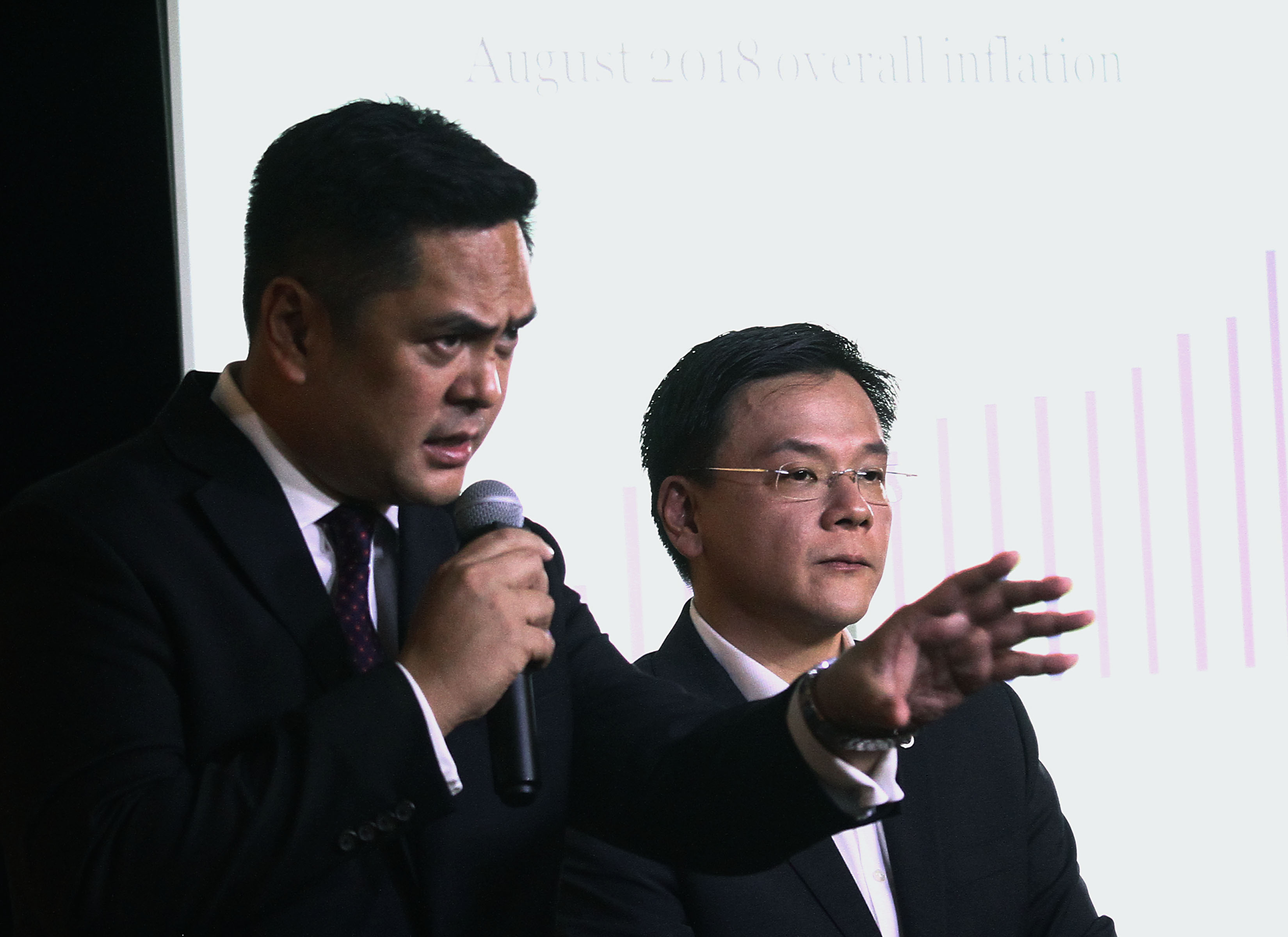Business and Economy
Measures to curb inflation underway: Lambino

PRESSING ISSUE. Presidential Communications Operations Office (PCOO) Secretary Martin Andanar assists Department of Finance (DOF) Assistant Secretary Tony Lambino in a question and answer forum during the launch of “The Presser”, which aims to address the concerns of the public regarding current issues’ at the ASEAN Theater, Philippine Information Agency (PIA) in Quezon City on Monday (Sept.10, 2018). (Oliver Marquez via PNA)
MANILA – An official of the Department of Finance (DOF) allayed fears surrounding the country’s elevated inflation rate, citing recently approved measures aimed at addressing supply constraints.
DOF Assistant Secretary Tony Lambino, during the launch of the Presidential Communications Operations Office (PCOO) program “The Presser” at the PIA Auditorium Monday, said the eight-point measure approved by the Economic Development Cluster (EDC) last week should address lack of rice supply, among others.
This, amid the further acceleration of food inflation due to supply issues created by weather disturbances.
Headline inflation rose to 6.4 percent last August from month-ago’s 5.
7 percent, bringing the average to date to 4.8 percent. Average inflation in the first eight months this year is already way beyond the government’s two to four percent target band until 2020.
The eight-point measures include replicating the issuance of certificates being issued by the Department of Agriculture (DA) to allow importation of fish to be distributed in wet markets in Metro Manila and other parts of the country, and immediate distribution of 4.6 million sacks of rice that are available in warehouses of the National Food Authority (NFA) to markets nationwide.
Members of the EDC expect the delivery by the end of this month of about two million sacks of rice that have been contracted earlier.
The supply is expected to be boosted further after the NFA Council authorized the importation of five million sacks of rice for delivery in the next one-and-a-half-months and another five million sacks in early 2019.
Since rice shortage is high in the areas of Zamboanga, Basilan, Sulu and Tawi-Tawi, the EDC agreed that 2.7 million sacks will be allocated in these areas.
Lambino said average price of rice, a staple food in the Philippines, in these four areas in Mindanao rose to about PHP42.85 per kilo last August from below PHP40 in the past.
“So over the short-term, the National Food Authority is helping address high rice prices by sending more stock to affected provinces and importing more rice,” he said.
Lambino said the NFA is sending around 4,000 bags of rice to Zamboanga alone on a daily basis thus, covering some 80 percent of the province’s rice requirement.
Tarrification
He said economic managers have also called on Senators to approve the proposed rice tariffication bill to liberalize rice importation.
To date, rice importation is covered by a quantitative restriction (QR), which allows importers to purchase rice from overseas based on their license.
With the proposed tariffication, Lambino said NFA would be mandated to ensure adequate emergency buffer as well as proper logistics “to make sure that this buffer stocks gets to where it’s needed.
”
He said the proposed measure is beneficial to local farmers since it will help increase their production or allow them to shift to higher value crops.
“Under a tariff regime, the tariff will be collected from anyone who wants to import rice and that money will be used to support our farmers,” he said.
Other recommended measures
Aside from measures aimed at increasing rice supply, the EDC also agreed to recommend to President Rodrigo R. Duterte the issuance of a directive that will further simplify and streamline the licensing procedures for importation of rice.
Other measures include: the formation of monitoring teams to be composed of representatives from the Department of Trade and Industry (DTI), NFA, Philippine National Police (PNP), National Bureau of Investigation (NBI); farmer groups to closely watch the transport of rice from ports to NFA warehouses and retail outlets; reduction of gap between farm gate prices and retail prices of chicken; the opening by the Sugar Regulatory Administration (SRA) of sugar importation to direct users to moderate costs for consumers; and for the Bureau of Customs (BOC) to prioritize the release of essential food items in the ports.
Lambino said the rate of price increases should decelerate once the eight approved measures have been implemented.
“The point is this – implementing the solutions is the priority of the Duterte administration’s economic development cluster. They are based on an understanding of the problem based on data from PSA, not speculations,” he added.





















